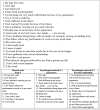Questionnaire and tools: clinical powerful instrument in acromegaly diagnosis and management
- PMID: 35322391
- PMCID: PMC9463243
- DOI: 10.1007/s40618-022-01782-x
Questionnaire and tools: clinical powerful instrument in acromegaly diagnosis and management
Abstract
Purpose: Acromegaly is a rare chronic disease characterized by systemic comorbidity and reduced quality of life. Although achieving biochemical control has always been the primary goal of acromegaly therapy, recent evidence has shown that the traditional assessment does not adequately capture the complexity of symptoms and patients' perception. These findings result in the need to improve a fast decision-making process of the clinician, who should not only take into account biochemical-instrumental criteria, but also patients' symptoms. With the aim of supporting the clinician in the diagnostic and therapeutic decision-making process several disease-specific tools have been developed. The aim of this review is to provide a description of the acromegaly-specific tools, presenting their main features, their application in daily practice, and their efficacy and utility.
Methods: A systematic search of Medline/PubMed, ISI-Web of Knowledge, and Google Scholar databases was done.
Results: Specific instruments and questionnaires have recently been developed to assist clinicians in the assessment of acromegaly. These are either Patient-Reported Outcome tools, such as Acromegaly Quality of Life Questionnaire (AcroQoL) and Pain Assessment Acromegaly Symptom Questionnaire (PASQ), or Clinician-Reported Outcome tools, such as ACROSCORE, SAGIT® and Acromegaly Disease Activity Tool (ACRODAT®). Such tools are extremely flexible and, therefore, have been widely adopted by endocrinologists and other professionals, so much so that they have also been included as recommendations in the 2018 international guidelines.
Conclusion: Questionnaires and tools are useful in the management of acromegaly patients. They help clinicians evaluate patients' symptoms and could assist in the evaluation of disease activity.
Keywords: ACRODAT®; AcroQOL; GH; IGF-1; SAGIT®.
© 2022. The Author(s).
Conflict of interest statement
Authors declare they have no conflicts of interest.
Similar articles
-
Signs and symptoms to determine if a patient presenting in primary care or hospital outpatient settings has COVID-19.Cochrane Database Syst Rev. 2022 May 20;5(5):CD013665. doi: 10.1002/14651858.CD013665.pub3. Cochrane Database Syst Rev. 2022. PMID: 35593186 Free PMC article.
-
Cost-effectiveness of using prognostic information to select women with breast cancer for adjuvant systemic therapy.Health Technol Assess. 2006 Sep;10(34):iii-iv, ix-xi, 1-204. doi: 10.3310/hta10340. Health Technol Assess. 2006. PMID: 16959170
-
Home treatment for mental health problems: a systematic review.Health Technol Assess. 2001;5(15):1-139. doi: 10.3310/hta5150. Health Technol Assess. 2001. PMID: 11532236
-
A rapid and systematic review of the clinical effectiveness and cost-effectiveness of paclitaxel, docetaxel, gemcitabine and vinorelbine in non-small-cell lung cancer.Health Technol Assess. 2001;5(32):1-195. doi: 10.3310/hta5320. Health Technol Assess. 2001. PMID: 12065068
-
The use of Open Dialogue in Trauma Informed Care services for mental health consumers and their family networks: A scoping review.J Psychiatr Ment Health Nurs. 2024 Aug;31(4):681-698. doi: 10.1111/jpm.13023. Epub 2024 Jan 17. J Psychiatr Ment Health Nurs. 2024. PMID: 38230967
Cited by
-
Patient perspectives on acromegaly disease burden: insights from a community meeting.Front Endocrinol (Lausanne). 2025 Feb 3;16:1516131. doi: 10.3389/fendo.2025.1516131. eCollection 2025. Front Endocrinol (Lausanne). 2025. PMID: 39963277 Free PMC article.
-
Shared decision-making and detection of comorbidities in an online acromegaly consultation with and without the Acromegaly Disease Activity Tool ACRODAT® using the simulated person approach.Pituitary. 2024 Oct;27(5):545-554. doi: 10.1007/s11102-024-01460-6. Epub 2024 Sep 25. Pituitary. 2024. PMID: 39320650 Free PMC article.
-
Validating evidence for the knowledge, management and involvement of dentists in a dental approach to sickle-cell disease.Braz Oral Res. 2024 Apr 5;38:e026. doi: 10.1590/1807-3107bor-2024.vol38.0026. eCollection 2024. Braz Oral Res. 2024. PMID: 38597546 Free PMC article.
-
Acromegaly: diagnostic challenges and individualized treatment.Expert Rev Endocrinol Metab. 2025 Jan;20(1):63-85. doi: 10.1080/17446651.2024.2448784. Epub 2025 Jan 5. Expert Rev Endocrinol Metab. 2025. PMID: 39757391 Review.
-
ACRODAT and SAGIT for the assessment of disease activity in acromegaly: a multicenter study of the Veneto region in Italy.Pituitary. 2025 Jun 22;28(4):76. doi: 10.1007/s11102-025-01543-y. Pituitary. 2025. PMID: 40544422 No abstract available.
References
-
- van der Lely AJ, Gomez R, Pleil A, Badia X, Brue T, Buchfelder M, Burman P, Clemmons D, Ghigo E, Jørgensen JOL, Luger A, van der Lans-Bussemaker J, Webb SM, Strasburger CJ. Development of ACRODAT®, a new software medical device to assess disease activity in patients with acromegaly. Pituitary. 2017;20(6):692–701. doi: 10.1007/s11102-017-0835-5. - DOI - PMC - PubMed
-
- Broersen LHA, Zamanipoor Najafabadi AH, Pereira AM, Dekkers OM, van Furth WR, Biermasz NR. Improvement in symptoms and health-related quality of life in acromegaly patients: a systematic review and meta-analysis. J Clin Endocrinol Metab. 2021;106(2):577–587. doi: 10.1210/clinem/dgaa868. - DOI - PMC - PubMed
Publication types
MeSH terms
LinkOut - more resources
Full Text Sources


